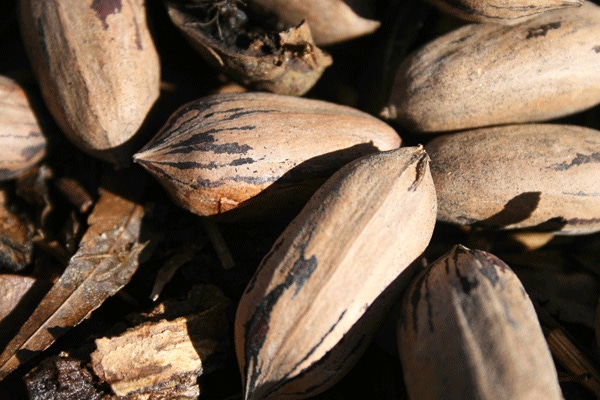
• Tim Haithcock has slowly grown his orchard year after year, and today, he has 310 trees and plans to plant 50 more this year. The demand for his pecans keeps growing, and Haithcock sees nothing but a bright future for his operation and for others who decide to produce pecans in eastern North Carolina.
January 21, 2011

Were it not for North Carolina State University and its Cooperative Extension Service, a thriving 10-acre pecan orchard near Goldsboro most likely wouldn’t exist, says owner Tim Haithcock.
A lawyer by day, Haithcock began his orchard 15 years ago with little more than a piece of land and a green thumb.
“I would simply not have a young commercial orchard without tremendous input and know how from North Carolina State University, especially (horticultural science specialist) Mike Parker and the county Extension agents,” the grower says. “They not only give information and sources of guidance, internet sites and publications, they also can be downright inspiring: They can share what other people are doing that they’ve found out about. It’s really invaluable.”
Haithcock didn’t grow up on a farm, and he never formally studied agriculture. But he always knew he wanted to have his own farm. That’s why he bought 79 acres of land in a rural part of Wayne County. At first, he rented the land for row crop production, but he turned to Extension and North Carolina State for help after he decided he wanted to make better use of the land.
He chose pecans because orchard management seemed like something he could do on evenings and weekends, when he wasn’t working at his day job.
Over the years, Haithcock has gotten advice on topics ranging from planning his orchard to preparing the soil to managing weeds and other pests. He’s also done his own research, and he regularly participates in the annual educational seminar put together by the North Carolina Pecan Growers Association. He’s on the association’s board of directors, and this past year hosted the seminar on his farm.
Haithcock has slowly grown his orchard year after year, and today, he has 310 trees and plans to plant 50 more this year. The demand for his pecans keeps growing, and Haithcock sees nothing but a bright future for his operation and for others who decide to produce pecans in eastern North Carolina.
He says that North Carolina’s proximity to large markets along the East Coast of the United States offers Tar Heel growers a strategic advantage. Not only that, but consumers are increasingly interested in buying healthy foods that they know are grown locally. And this yields local economic benefits, he adds.
“This past year I employed three people other than my family to help me. That plowed a little bit of money back into the community,” Haithcock says.
“And I think the future for pecans in North Carolina is extremely bright. We have the land. We have the climate. We have a population in North Carolina that’s growing the past 10 years at 18 percent,” he says. “I think it’s a great way for people who own land in Eastern North Carolina to diversify and get a good return on their investment.”
You May Also Like



